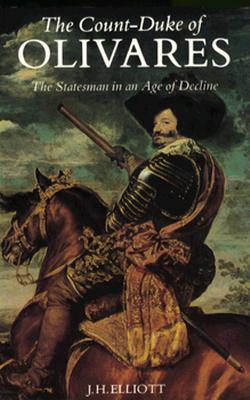
Don Gaspar de Guzmán, Count-Duke of Olivares (1587-1645), was the principal minister and favourite of Philip IV of Spain, and for two decades he guided the destinies of the country that was still the greatest power in the world. A dominant figure in the Europe of the Thirty Years' War, he struggled to maintain Spanish hegemony at a time when the traditional foundations of Spain's power were being eroded, and Spain itself was increasingly being perceived as a great power in decline. The story of his political career, and of his efforts to check the process of decline by an ambitious programme of domestic reform, becomes an epic of titanic and ultimately unsuccessful struggle, culminating in personal tragedy and national disaster. The Count-Duke met his match in his great French rival, Cardinal Richelieu, and France replaced Spain as the leading European power. For all the Count-Duke's enormous historical importance, no attempt has previously been made to study in detail his political aspirations and his career as a statesman. The sheer scale of the enterprise, along with major problems of documentation, has deterred historians from embarking on the study of a man whose policies touched the lives of millions in Europe and the Americas over a period of more than twenty years. This work therefore fills a gaping void in modern European and Spanish history. In this comprehensive political biography Olivares' domestic and foreign policies are skilfully woven together into a sustained narrative on the grand scale. Based overwhelmingly on primary and often unknown sources, this is a study of Spain and Europe in the 1620s and 1630s, but it is also the study of a man. Through it all, the author never loses sight of Olivares himself, a massive figure of fluctuating moods and emotions, once described by Braudel as a cortege of personalities requiring a cortege of explanations. This elegantly written book will be seen as a landmark in the study of a man and an age; indispensable to specialists and students, but of interest also to the general reading public.
Author

Sir John Huxtable Elliott, FBA, was an English historian, Regius Professor Emeritus at the University of Oxford and Honorary Fellow of Oriel College, Oxford and Trinity College, Cambridge. He published under the name J.H. Elliott. Elliott was educated at Eton College and Trinity College, Cambridge. He was an assistant lecturer at Cambridge University from 1957 to 1962 and Lecturer in History from 1962 until 1967, and was subsequently Professor of History at King's College, London between 1968 and 1973. In 1972 he was elected to the Fellowship of the British Academy. Elliott was Professor in the School of Historical Studies at the Institute for Advanced Study, Princeton, New Jersey from 1973 to 1990, and was Regius Professor of Modern History, Oxford between 1990 and 1997. He held honorary doctorates from the Autonomous University of Madrid (1983), the universities Genoa (1992), Portsmouth (1993), Barcelona (1994), Warwick (1995), Brown University (1996), Valencia (1998), Lleida (1999), Complutense University of Madrid (2003), College of William & Mary (2005), London (2007), Charles III University of Madrid (2008), Seville (2011), Alcalá (2012), and Cambridge (2013). Elliott is a Fellow of the Rothermere American Institute, University of Oxford, of whose Founding Council he was also a member. Elliott was knighted in the 1994 New Year Honours for services to history and was decorated with Commander of Isabella the Catholic in 1987, the Grand Cross of Alfonso the Wise in 1988, the Grand Cross of Isabella the Catholic in 1996, and the Creu de Sant Jordi in 1999. An eminent Hispanist, he was given the Prince of Asturias Prize in 1996 for his contributions to the Social sciences. For his outstanding contributions to the history of Spain and the Spanish Empire in the early modern period, Elliott was awarded the Balzan Prize for History, 1500–1800, in 1999. His studies of the Iberian Peninsula and the Spanish Empire helped the understanding of the problems confronting 16th- and 17th-century Spain, and the attempts of its leaders to avert its decline. He is considered, together with Raymond Carr and Angus Mackay, a major figure in developing Spanish historiography.